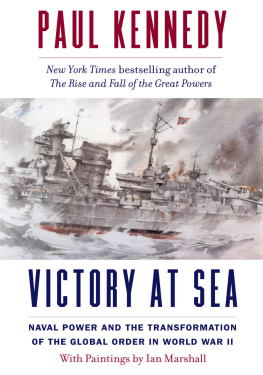





This book is dedicated to the memory of Barry Dennis Hunt (1937-1992). A graduate of the Royal Military College (RMC) of Canada and Queen's University, Barry Hunt served his country with distinction as a soldier before returning to RMC to teach in its History Department. A naval historian of note himself, Barry Hunt would have found delight in this volume. He will be missed by all who knew him.
Contents
ix
Acknowledgments
The editors are indebted to the Royal Military College of Canada which hosted the twentieth Military History Symposium, incurred a portion of its expense and provided essential support services and assistance. The symposium and thus this volume would also not have been possible without the financial support of the Social Sciences and Humanities Research Council.
The symposium was truly a collective effort. The day-to-day support and encouragement of colleagues and students within the Department of History were invaluable. We particularly appreciated the help of those cadets who made themselves available throughout the conference and the work of our departmental secretary Mrs. K. Brown and of Mrs. Ellie Hudson. Also thank you to Laura Haycock for her work in keying in and setting up this manuscript. Finally, we wish to express our appreciation for all those who attended the symposium and made it the success that it was.
NAVIES AND
GLOBAL DEFENSE
Introduction
Keith Neilson and Elizabeth Jane Errington
"[I]f we lose our sea supremacy we lose our Empire."' This remark, penned by the British permanent undersecretary at the Foreign Office in 1907, underlined the significance of sea power for the British of the era. However, this sentiment is capable of generalization, for any attempt to affect events worldwide necessarily has involved the exercise of sea power: there is an inextricable link between naval strength and global power. The intent of this book, which evolved out of a conference held at the Royal Military College of Canada in March 1994, is to explore the nature of this link by considering both the theory and practice of the navies of the two countries--Great Britain and the United States--that have dominated world politics in the last century and a half.
In a broad-ranging paper that set the tone of the conference, Donald Schurman explained why naval history has taken the form that it holds today. Schurman argued that naval history, properly considered, deals with a number of issues--cultural, diplomatic, economic and financial-that in the British case traditionally were closely linked with the study of the British Empire and the projection of British power overseas. This historical tradition was exemplified by the work of Gerald Graham and Brian Tunstall. Since the early 1950s, however, British naval history-and naval history generally--has tended to be considered antiquarian and to focus on battle history and narrow nuts-and-bolts issues. How has this come to pass? Schurman explained that it resulted from two facts: the disfavor into which the study of the British Empire fell during the period in which it degenerated into Commonwealth and the undue historical emphasis placed on the role of armies in the long shadow cast by two world wars with Germany. With respect to the latter, the work of Sir Michael Howard and Paul Kennedy has been particularly pernicious. Howard posited a false dichotomy between the defense of British interests imperially and on the continent, while Kennedy emphasized that changing technology has resulted in the dominant land powers assuming the ascendency over the leading naval power in the twentieth century. Schurman called for a return to the wider view of what constitutes naval history--for its reintegration into the broader stream of historical endeavor--and argued that this would lead to an abandonment of Kennedy's conclusions.
Such an argument would have found favor with Sir Julian Corbett, one of the earliest practitioners of the kind of history that Schurman lauded.' As Geoffrey Till pointed out, Corbett was careful to distinguish between what he termed "naval" strategy--the study of sea power alone-and "maritime" strategy--the study of sea power in connection with military strategy and foreign policy. For Corbett, a maritime strategy meant that the country with control of the sea could utilize it to ensure safe and rapid communications for its commerce and to project its military power ashore. This concept was later developed into what Basil Liddell Hart termed the "British way in warfare."'
Till argued that Corbett's ideas explained why Britain was able to obtain and maintain a global empire. Using the Royal Navy (RN) not only as a naval weapon against other fleets but also as a protector of Britain's commerce and a diplomatic bargaining chip and lever, the British were able to ensure their position against all comers. The means of doing so were never constant. At times, Till pointed out, the British lacked the necessary resources to carry on single-handedly; in such circumstances alliances were necessary and naval battles were avoided if the outcome was in doubt or if maritime communications could be maintained without combat. At other times, changing technologies made the maintenance of maritime supremacy difficult. For example, during the First World War, the submarine posed a threat to surface navies and the British position, while after the First World War air power threatened to lessen the value of maritime power generally. However, in both cases, Till concluded, the challenge was met: the first through convoy; the second through naval air power and improved anti-aircraft defenses. The only time that some of Corbett's ideas fell into disfavor with the RN, Till contended, was after the failure of the Dardanelles campaign. This meant that the projection of British power ashore was not contemplated again until the Second World War, and even then there was a reluctance to attempt amphibious operations.
Alfred Thayer Mahan had a rather different concept of the use to which naval power could be put in a global context. Mahan, unlike Corbett, argued that navies needed to engage the enemy in order to assure command of the sea. John Hattendorf explained that Mahan argued in such a fashion not merely out of conviction but also out of a need to create an intellectual framework for the discussion of naval affairs in the United States in the late nineteenth century. In this fashion, Hattendorf explained that Mahan should be considered in the context of his time, as a man with ideas, rather than reduced to a doctrine, a "Mahanian. " To further this, Hattendorf pointed out how the religious aspects of Mahan's ideas are generally not considered by those who have reduced this complex man to a strategic formula.










